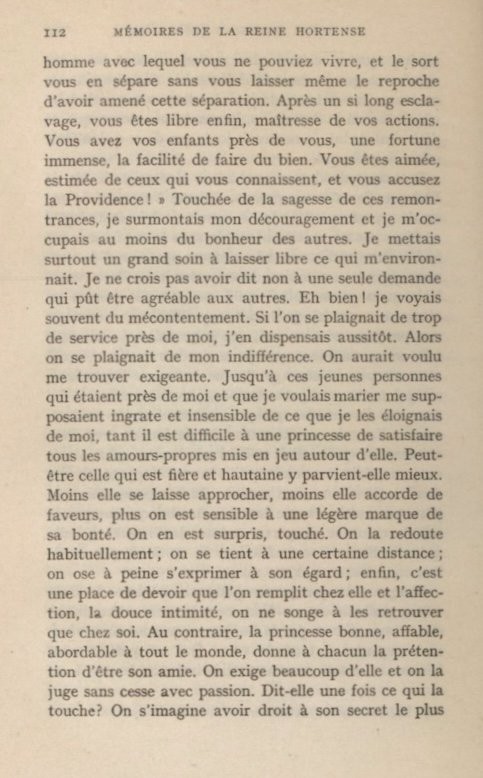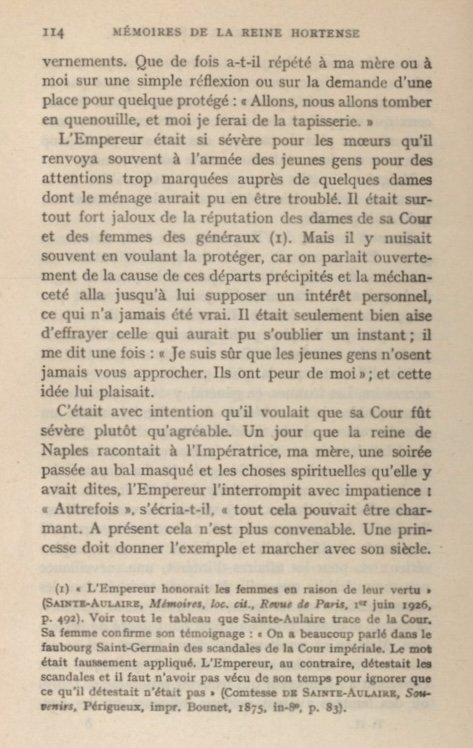Let’s have another look at Hortense’s Memoirs. If you want to read the book it is available for free at the side bar in English and French. Use the widget on the sidebar to translate the text below into pretty much any language.
We see how the environment around Napoleon changes without Josephine. Napoleon says he is proud to ward men off of Hortense.
Hortense’s memoirs continues:
If any complained that I gave them too much to do I at once relieved them of a part of their duties. Then they would complain that I did not pay enough attention to them. People tried to prove I was fussy. Even the young women I had with me and for whom I sought to find husbands accused me of being ungrateful and hard-hearted because I sent them away from me.
How difficult it is for a princess to satisfy all the different personal ambitions that revolve about her. Perhaps one who is proud and haughty succeeds better.
The more distant she is, the fewer favors she bestows, the more people value the least sign of graciousness on her part. If she gives them a look they are surprised and touched. People generally fear her; they hold themselves aloof and hardly dare as much as express an opinion about her.
To belong to her household is considered a duty, and no one expects any marks of affection or intimacy. On the contrary a princess who is good, kind, willing to listen to anyone, allows all those with whom she comes in contact to consider themselves her friends. Much is expected of her; her slightest action is freely commented on. If she once mentions something she cares about, the person to whom she has spoken considers himself from then on entitled to know all her secret thoughts.
If a stranger converses with her at too great length, others are jealous, criticize her, complain about her, and as they themselves misunderstand her actions they make others do so. This is the way in which those who call themselves our friends, and who consider themselves such, often do us more harm than enemies who are too far away to be able to wound us by their attacks.
In spite of these little drawbacks which are inseparable from a position of prominence my household was fairly calm and as united as it could possibly have been.
As for the Emperor's court it was serious and staid. It lacked that refinement of courtesy, that polish which are characteristic qualities of French society.
A young man scarcely dared to speak to a young woman. He was afraid of being in the least attentive for fear of making himself conspicuous, which would indeed have been the case. The court was composed of so many different cliques that it was necessary to observe the utmost prudence.
The women in general were remarkable for their good behavior, for their dignity which even became at times rather rigid, and for their modesty which was never awkwardness. One never heard a loud discussion.
If one did not find there the wit, ease and courtliness of a Sevigné or La Fayette, or those amusements which flourished in the days when people's sole desire was to make themselves agreeable, yet one discovered on the part of the women an abundance of solid virtues, the assiduity of maternal devotion and all the duties it involves, a willingness to sacrifice idle amusements for evenings spent in serious occupations, and an ability in the conduct of business matters equal to that which the husband away at the front might have exercised had he been present.
Moreover, all the arts—music, painting, song and dance—were practiced with talent. On the other hand a woman who wrote poetry or took an interest in politics would have been made fun of. This was in accordance with the Emperor’s tastes.
He objected to the days when women had political influence. How often did he not say to my mother or me, when we made some simple remark or asked for a position for one of our proteges:
“Now then, now then, we are getting ready to be ruled by a distaff and I shall have to do embroidery."
The Emperor was so severe as regards personal morality that he frequently sent to the front young men who had been sufficiently attentive to some married women to run the risk of disturbing their married life.
He was especially jealous of the reputation of the court ladies and of the wives of his generals. But his efforts to protect them frequently did the reverse, for people would openly discuss the reasons for these sudden departures, and it was even said that he caused them for reasons of his own gossip that was never true.
He merely sought to frighten the woman who might for an instant have thought of forgetting her duties.
Once he said to me, "I am sure young men never dare to look at you. They are afraid of me."
This idea amused him. It was on purpose that the Emperor wished his court to be severe rather than entertaining.
One day when the Queen of Naples was telling my mother, the Empress, about an evening she had spent at a masked ball and all the witty things she had said there, the Emperor interrupted her impatiently saying: "Once upon a time all that was amusing enough. It is not any more. A princess must set an example and behave in accordance with the rules of her day. The time for light and frivolous amusements has passed. Everything now must be serious and severe."
Yet he would occasionally be quite merry when alone with us. This was true particularly in the days when my mother was with him. On such occasions he whispered all sorts of remarks into her ear and if he thought I might have overheard them and feel embarrassed he would laugh till tears came to his eyes.
Once, for instance, when my mother was present, he was telling me about his former success with the ladies, adding, "I never found a single one who resisted:
“That was probably because you never tried one who was in the habit of resisting."
He began to laugh, pinched my ear till I could have cried and said to my mother, "Listen to what your daughter is saying about me. She thinks I have always been old."
I have always seen him more reserved with his new wife, but also more gentle and more anxious to please. He frequently urged her to enjoy the pleasures of her age.
“If you like to dance," he said, "send for the music. Go and watch the masked balls. Visit the public buildings and state factories."
“No," replied the Empress, "not unless you go with me."
“But I have no time. Go with Hortense. The Parisians will be glad to catch a glimpse of you."
“No, I would rather stay here." And that would be the end of the matter. If she kept him waiting for dinner, he would greet her with the words, "Ah I I see, you have been making yourself beautiful."
Yet often he had been greatly displeased with my mother for an equally unimportant matter. One day at one of the great receptions, when we were wearing all our diamonds, after he had complimented us on our appearance the Emperor caught sight of himself in the mirror and looking at his simple uniform of the Guard, said as he turned away, "One must be very vain to dress so simply."
He charmed everyone who came near him when he gave way to his good-nature. No one who saw him in those moods would have guessed he was the man before whom all Europe trembled and whose greatness of mind impressed us as much as it did any other members of his court.
He never appeared otherwise than grave in public. People imitated him and wherever he appeared he became the center of attention. Everyone hoped he would speak to him, and I have seen men at receptions given by the Empress decline to sit at a card-table with young and pretty women and remain standing, in the hope that the Emperor, who sometimes liked to chat with those who were in the drawing-room doing nothing, might speak to them.
When the Emperor felt like talking there was not a subject on which he did not have something original to say. He never feared to utter his political views. Once when surrounded by a number of persons attached to the court he said: "I never thought of replacing the Bourbons on the throne. They would not have been able to make France happy for two reasons: because the nation has harmed them too much ever to trust them, and because they would never have been able to satisfy the claims of those they brought back with them. A new man was necessary, a man not contaminated by the excesses of the Revolution, who could unite all parties and who was strong enough to stabilize all the advantages the Revolution had won."
The original French is available below:








